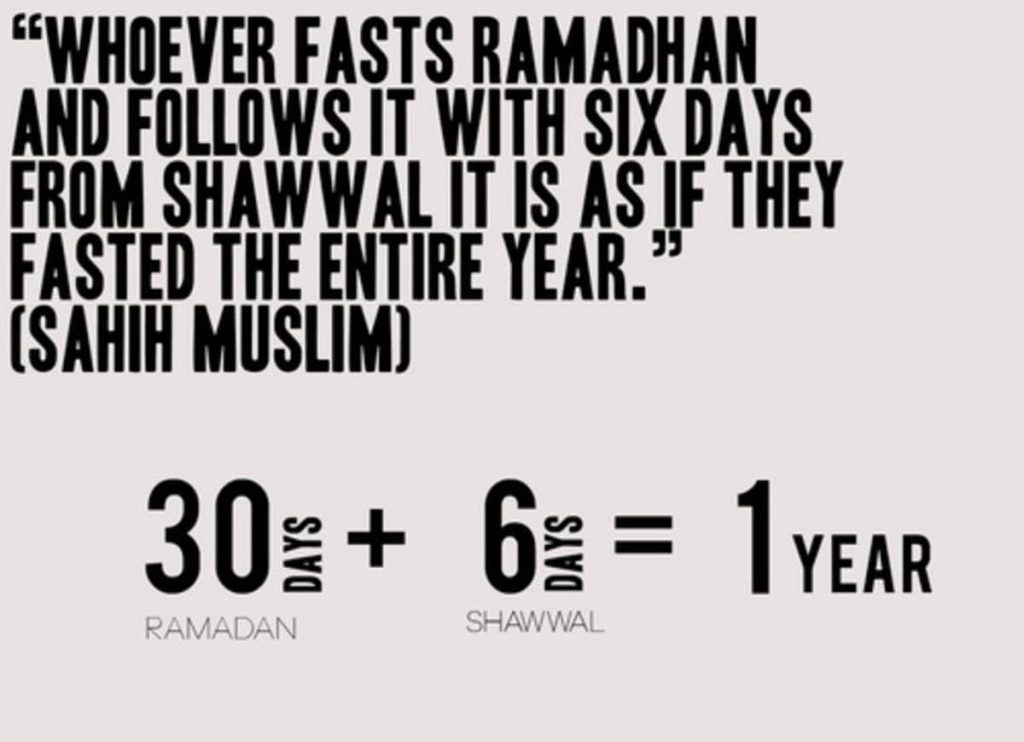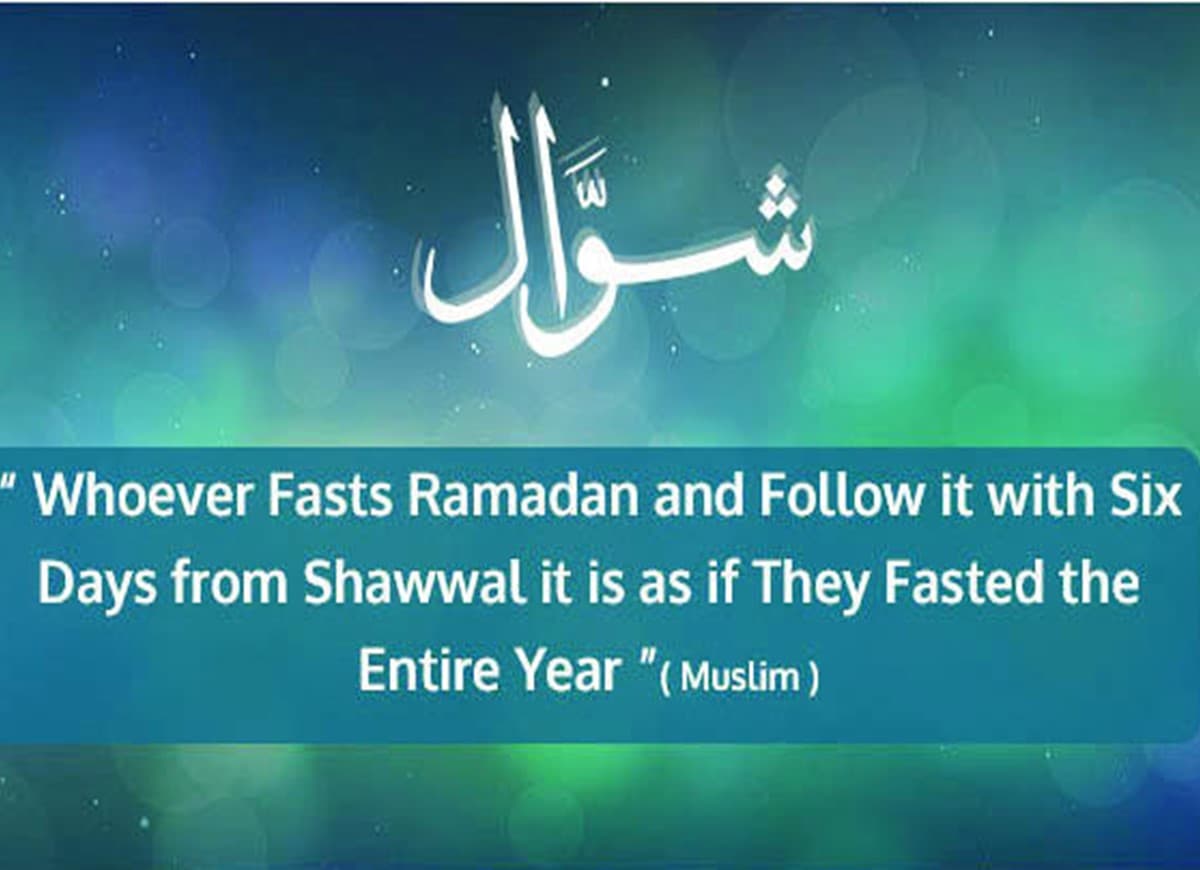Continuing the Ramadan Momentum: Understanding the Significance and Benefits of Fasting in Shawwal” Abu Ayyub al-Ansari writes the fact that Allah’s Messenger (peace be on him) states:
“Whoever fasts the month of Ramadan and immediately follows it by six days of fasting during Shawwal, the month in which he fasts Shawwal it will be like that he had been fasting all the way through.” [Sahih Muslim (1163)]
This month, Shawwal is designated to observe extra fasts because this month is immediately following Ramadan. Six days of fasting for voluntary correspond to the obligatory fasts of Ramadan, as are the Sunnah and mandatory prayers.
It is ascribed to Thawban, where the Prophet (peace rest upon him) stated: “The fast of Ramadan is similar to the observance of the fast of ten months.
Six-day fasting during Shawwal is equivalent to fasting for two months. Combining these two practices is equivalent to all-year-round fasting.” (Sahih Ibn Khuzaymah (2115) as well as Sunan al Nasa’i al Kubra (2860) – – and authenticated by al-AlbaniAl-Albani.
Also Read: Eid al-Fitr: An Introspective Celebration of Renewal and Gratitude
Al-Nawawi observes [Sharh Sahih Muslim (8/56)]:
Researchers have claimed it’s similar to observing an entire year of fasting, as the benefits of doing good deeds will be multiplied ten times over. So, fasting during the entire month of Ramadan is equivalent to fasting for ten months and eating a meal every day. Shawwal is similar to fasting two times.

The virtues of fasting for Six Days in Shawwal
1. The six-day fasting in Shawwal following the Ramadan fast offers the person the benefit of fasting all the year.
2. The fasts of Shaban and Shawwal are akin to the Sunnah prayers that are part of the five obligatory prayers. As with that Sunnah prayer, the additional fasts are meant to cover the shortcomings in the execution of our obligation to worship.
When we face the Day of Judgment, our prayers and acts of worship make up for the deficiencies in how we perform our obligations. We all have weaknesses in how we observe our Ramadan fasts and need something to make up for the shortcomings.
ZAKAT:
Zakat al Fitr: The Obligatory Eid Gift to Be Made Before The End of Ramadan
Note: The shortcomings discussed from now on are not the absence of days of fasting. Instead, they’re the shortcomings in our behavior that undermine the worth that we worship.[Note:
3. The return to the custom of fasting just after Ramadan is a sign we can say that our Ramadan fasts were consented to. If Allah is pleased that we worship Him, he enables us to perform more actions of devotional worship. The maxim goes:
The benefit of virtue is the reward for virtue. Thus, following a good deed by doing it with others is a sign that Allah recognized the first act. In contrast, when a sinful one later follows a good act, it’s a sign that Allah could not have accepted the first good act.
4. The people who adhere to those who observe the vital month of Ramadan receive a reward of the day of Id al-Fitr. This is the day on which the fast is celebrated. The practice of fasting once more is a way to give gratitude for Allah to Allah for the blessings we receive. There is nothing more gratifying than forgiveness for mistakes, and we know that the forgiveness of past mistakes compensates for the fasting of Ramadan.
Also Read: Eid al-Fitr: An Introspective Celebration of Renewal and Gratitude
Allah has commanded us to be grateful for the blessings brought by the Ramadan fast and to do it by referring to Him and other ways of expressing gratitude. Allah states: “(He wants you) to finish the count of days, and also to be awed by Him for having been with you, and maybe you can offer thanks.” [Surah al-Baqarah: 185]
Fasting during the days of Shawwal is a way to express our gratitude to Allah for blessing us with His blessings during our practice of the Ramadan fast.
It is believed that certain Pious Predecessors tried to rise at late at night to recite in the Tahajjud prayer. After Allah gave them the grace to get up, and they did, they would fast the following day in gratitude to Allah by blessing their ability to follow this prayer.
At one time, Wuhayb B. al-Ward doubted the blessings associated with many acts of devotion, and he responded: “Do not ask about the blessings you can gain by these actions of worship. Instead, inquire about what you can do to express gratitude to Allah if Allah blesses you to carry out these acts, as Allah has the power to aid us in performing these acts.”
Also Read: Fasting Begins on Thursday in Saudi Arabia Despite There Being No Ramazan Moon
Every blessing Allah bestows us is something we can be grateful for. In addition, the moment Allah blesses us, to indicate gratitude, this is another blessing that deserves more praise from us.
If we express gratitude to Allah more formally, that is another blessing worthy of our gratitude. There is no limit to this; we will never be grateful enough. If we realize that our gratitude is never enough, it is the most significant expression we can offer.
A Legal Ruling Concerning Shawwal’s Six Days of Shawwal
Al-Shafii Ahmad Ibn. Hanbal and Ishaq al-Rahawayh have a more favorable view and recommend fasting for at least six days during the month of Shawwal. The opinion is also associated with Ibn `Abbas, Ka’b al-Ahbar, Tawus, al-Sha’bi, Maymun b. Mahran as well as Ibn al-Mubarak.
They base their beliefs on the hadiths we’ve reviewed above.
Other people have thought of fasting seven days during the month of Shawwal as something to be resented. This notion has come to Malik or Abu Hanifah.
They claim that the public is fearful that they may interpret the six days of fasting as a requirement. They also consider it to be imitating Jesus and the People of the Scripture to overdo the number of days of fasting during the fasting period.
But, these arguments are bogus in light of the explicit declarations by the Prophet (peace be with him) that support the fast. If we decided to stop the Sunnah action because we’re in excess of the requirements, then we’d have to abstain from any recommended fast, including the Ashura fast and the fast that falls in the middle of the month.
It is believed that Malik used to fast personally every day of Shawwal. In addition, later, Hanafi scholars decided there was no reason not to fast today.
Also Read: Night of Decree (Qadr): 9 Uplifting Reminders for a Spiritually Rich Experience
The Maliki jurist Ibn `Abd al-Bar explains [al-Istidhkar (3/380)(3/380):
Malik didn’t know about the hadith attributed to Abu Ayyub al Ansari, although it is a relic of those of Madinah. Nobody has the knowledge that others have. Malik explained and clarified his dislikes about it. He was worried that it would be a part of the rites added to the fasting rituals of Ramadan by people in general. Malik was very prudent when it came to issues related to religion.
For those who are able to fast every day during the month of Shawwal to obtain additional blessings, as Thawban describes it, this is something Malik was not opposed to Malik – and Allah knows best since fasting acts as a protective shield, and its benefits are widely known. If we are willing to give up drinking and food items for Allah’s pleasure, it’s a moral and noble act. Allah tells us: “and engage in good actions that you may succeed.” [Surah al-Hajj: 77]
Malik was fully aware of this.
How to Fast for the Six Days of Shawwal
There are a variety of opinions about this issue:
Certain scholars believe it is better to fast for six days in order of succession, starting on Day 2 of Shawwal. This is the belief of Ibn al-Mubarak and al-Shafii.
Some people believe it is better to observe the six days of fasting regularly, spreading them out through the months of Shawwal. This is the opinion in the case of Ahmad, who is. Hanbal and Waki`.
There are also those who consider that all days should be delayed till later into the month and not too close to the day of Id, which is a time for celebration and celebration. They favor fasting for the three days between the two months (ayyam al-bid) and the three days right before or following. This is the view of Mamar and Abd al-Razzaq.
There is a lot of freedom in this. We can decide to take any of these methods we like.
Categories: PRAYER (Salat), ALMS (Zakat), SAWN (Fasting) HAJJ (Pilgrimage) & DUA (Supplications), Hadith and Tafseer, The Holy Quran, Quran Jaz 1- 114
Topics: Ushr and Zakat, Hijab, Arabic Corner, Faith, Islamic History, Biography, Sirat ul Nabi PBUH, Islamic Studies, Halal & Haram








